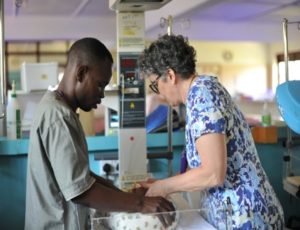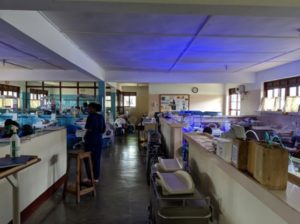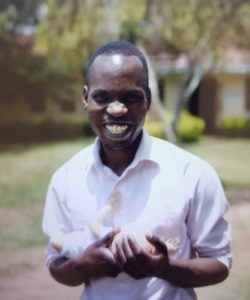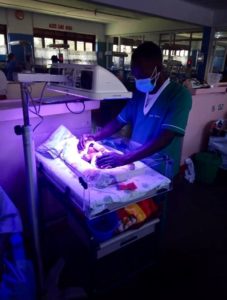
 Neonatal Therapists worldwide are committed to helping neonates flourish beyond survival, yet some countries are far more challenged than others. In fact, 90% of all the high-risk infants born are in South Asia and Sub-Saharan Africa (Kabugo et al., 2021). To help address these disparities, the Adara Development Team made a commitment to the Neonatal Intensive Care Unit at Kiwoko Hospital in Central Uganda.
Neonatal Therapists worldwide are committed to helping neonates flourish beyond survival, yet some countries are far more challenged than others. In fact, 90% of all the high-risk infants born are in South Asia and Sub-Saharan Africa (Kabugo et al., 2021). To help address these disparities, the Adara Development Team made a commitment to the Neonatal Intensive Care Unit at Kiwoko Hospital in Central Uganda.
This 2019 project, titled Hospital to Home (H2H), was funded to improve the care of neonates in the Nakaseke district, where many communities live in extreme poverty. Central to this incredible story are two talented neonatal therapy clinicians, Tadeo Kigozi (OT) and Lauren Adams (PT). These celebrated NANT Members share an extraordinary commitment of mentorship and desire to elevate neonatal therapy practices in Uganda.
What is the NICU Environment like in Kiwoko?
Families travel great distances to access this private hospital, known for its exceptional neonatal care. In Kiwoko, infants born 28 weeks or greater frequently survive, thanks to the available technology of CPAP, phototherapy, incubators, and specialty training. With a ratio of one NICU nurse to ten critically ill infants, staff rely heavily on the postpartum mothers to complete basic cares. Every three hours they perform diapering, skin to skin, and cup or breast feeding and, in some circumstances, provide expressed breast milk by gavage until full oral feeding is achieved.

How was the Hospital to Home (H2H) Program Involved?
To improve the developmental outcomes of NICU graduates in Uganda, the H2H program incorporated a full-time neonatal therapy position and subsidized the training of ten Village Health Team Mentors for community support. This two-pronged approach fosters better neuroprotective, developmental care practices in the NICU, and early developmental screening and intervention within the community. A key element of implementing Village Health Team Mentors is to designate respected community leaders who can provide education and support within the language and cultural contexts of each village.
 Who Became the First Neonatal Occupational Therapist in Uganda?
Who Became the First Neonatal Occupational Therapist in Uganda?
Tadeo (pronounced TA-DAY-O) obtained his occupational therapy credentials at the Uganda Institute of Allied Health and Management Sciences in Mulago. Upon graduation, Tadeo pursued his strong desire to work with infants and families which led him to apply for the Neonatal Therapy position in Kiwoko Hospital. Tadeo’s intuitive ability to read infant cues and connect with families stood out during the interview process. Over the course of three weeks, Lauren Adams, a neonatal physical therapist from the Seattle area, mentored Tadeo while in Uganda where she first noted his persistent desire to learn. Since 2019, Lauren has continued to mentor him using video conferencing and email. To date, Tadeo’s family-centered neonatal therapy practice involves cue-based feeding, kangaroo mother care, therapeutic positioning, safe sleep, developmental tracking, and parent education. More recently, Tadeo has added to his knowledge base using the NANT online Special Topic Courses and Membership Benefits he received through an anonymous donor.
Who Provided the Neonatal Therapy Training and Mentorship?
While working at the University of Washington Medical Center, Lauren Adams was hand selected by the Adara Group for her expertise in neonatal therapy and for her outstanding interprofessional teamwork. She is often recognized for her emphasis in evidence-based practices and preventative approach to neonatal care. With her especially kind demeanor and thirty plus years of experience, she was a perfect candidate for this project. Through her mentorship, Lauren has left a lasting imprint in the village of Kiwoko and contributed to the inception of neonatal therapy in the country of Uganda.
How Can We Support These Connections Across the Continents?
Despite our geographic and cultural differences, we are unified in the desire to elevate developmental outcomes for all high-risk infants and their families. As we come together in this unique multidisciplinary community, the interprofessional collaboration is inspiring and illustrative of the collective strength of the neonatal therapy profession. In celebration of International Neonatal Therapy Week, let’s take a moment to celebrate Tadeo and Lauren’s hard work and express our gratitude for advancing the field of neonatal therapy in Uganda!

Reference:
Kabugo, D., Nakamura, H., Magnusson, B., Vaughan, M., Niyonshaba, B., Nakiganda, C., Otai, C., Haddix-McKay, K., Seela, M., Nankabala, J., Nakakande, J., Ssekidde, M., Tann, C. J., Al-Haddad, B. J. S., Nyonyintono, J., Mubiri, P., Waiswa, P., & Paudel, M. (2021). Mixed-method study to assess the feasibility, acceptability and early effectiveness of the Hospital to Home programme for follow-up of high-risk newborns in a rural district of Central Uganda: a study protocol. BMJ Open, 11(3), e043773-e043773. https://doi.org/10.1136/bmjopen-2020-043773
